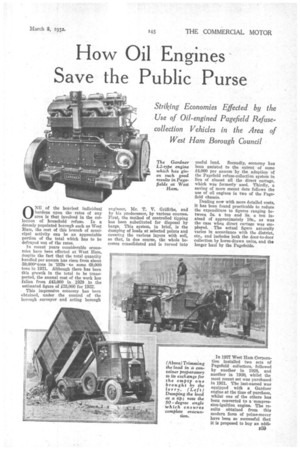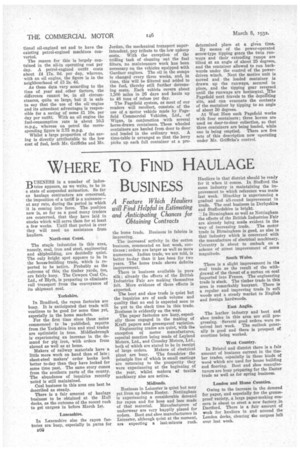How Oil Engines Save the Public Purse
Page 117

Page 118

If you've noticed an error in this article please click here to report it so we can fix it.
Striking Economies Effected by the Use of Oil-engined Pagefield Refusecollection Vehicles in the Area of West Ham Borough council
0 NE of the heaviest individual burdens upon the rates of any area is that involved in the collection of household refuse. In a densely populated borough such as West Ham, the cost of this branch of municipal activity can be an appreciable portion of the total which has to be defrayed out of the rates.
In recent years considerable economies have been effected at West Ham, despite the fact that the total quantity handled per annum has risen from about 59,000.6%tons in '192t. to some 69,000 tons in 1931. Although there has been this growth in the total to be transported, the annual cost of the work has fallen from 143,000 in 1929 to the estimated figure of .£35,000 for 1932.
This impressive economy has been obtained, under the control of the borough surveyor and acting borough
engineer, Mr. T. V. Griffiths, and by his predecessor, by various courses. First, the method of controlled tipping has been substituted for disposal by barge. This system, in brief, is the dumping of loads at selected points and covering the various layers with soil, so that, in due course, the whole becomes consolidated and is turned into
useful land. Secondly, economy has been assisted to the extent of some £4,000 per annum by the adoption of the Pagefield refusecollection system in lieu of almost all the direct cartage, which was formerly used. Thirdly, a saving of more recent date follows the use of oil engines in two of the Pagefield chassis.
Dealing now with more detailed costs, it has been found practicable to reduce the expenditure to figures ranging between 5s. a ton and 8s. a ton instead of approximately 10s., as was the case when direct cartage was employed. The actual figure naturally varies in accordance with the district, etc., and includes both the door-to-door collection by horse-drawn units, and the longer haul by the Pagefields.
Canal oil-engined set and to have the existing petrol-engined machines converted.
The reason for this is largely contained in the all-in operating cost per day. A petrol-engined outfit costs about £4 17s. 9d. per day, whereas, with an oil engine, the figure is in the neighbourhood of £3 2s. 4d.
As these data vary according to the time of year and other factors, the difference -cannot be, in all circumstances, quite so large, but it is safe to say that the use of the oil, engine and its attendant advantages is responsible for a saving of some £1 10s. per day per outfit With an oil engine the fuel-consumption rate is about 10.5 m.p.g., whereas on petrol the corresponding figure is 3.75 m.p.g.
Whilst a large proportion of the saving is directly attributable to the low cost of fuel, both Mr. Griffiths and Mr. Jordan, the mechanical transport superintendent, pay tribute to the low upkeep costs. With the exception of the trifling task of cleaning out the fuel filters, no maintenance work has been necessary on the vehicles equipped with Gardner engines. The oil in the sumps is changed every three weeks, and, in time, this will be filtered and added to the fuel, thereby still further decreasing costs. Each vehicle covers about 1,500 miles in 28 days and hauls up to 48 tons of refuse per day.
The Pagefield system, as most of our readers will recollect, consists of the use of a motor vehicle made by Pagefield Commercial Vehicles, Ltd., of Wigan, in conjunction with several horse-drawn containers. These wheeled containers are hauled from door to door and loaded in the ordinary way. A time-table is arranged so that the lorry picks up each full container at a pre
determined place at a given time, By means of the power-operated screw-type tipping gears the twin runways and their extending ramps are tilted at an angle of about 25 degrees, and the container allowed to run backwards under the control of the powerdriven winch. Next the motive unit is moved and the loaded container is drawn up the runways, secured in place, and the tipping gear reversed until the runways are horizontal._ 11'he Pagefield next travels to the depoilting site, and can evacuate the contents of the container by tipping to an angle of about 50 degrees.
At West Ham each Pagefield works with four containers; three horses are used on door-to-door collection, so that three containers are being loaded, while one is being emptied. There are five sets of this description now operating under Mr. Griffiths's control.












































































































































































